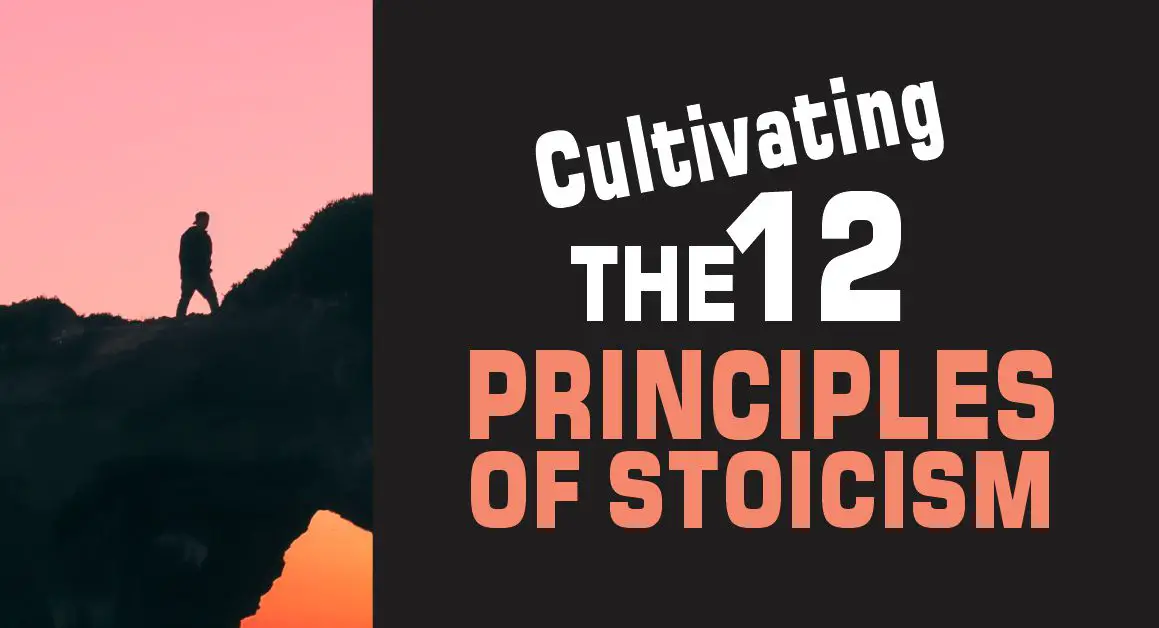Last updated on June 8th, 2025 at 02:14 pm
Discover the 12 timeless principles of Stoicism and how to apply them in daily life through this ancient Greek philosophy’s practical guidance.
Stoicism, an ancient Greek philosophy, offers timeless wisdom for navigating life’s challenges with resilience and clarity.
Its 12 principles provide a framework for cultivating inner strength, embracing virtue, and finding tranquility amidst adversity.
By understanding and practicing these Stoic principles, you can learn to focus on what is within your control, accept the inevitable, and live with purpose and integrity, sustaining a balanced and fulfilling life.
Related: Developing A Stoic Personality
Table of Contents
- What are the Stoic Principles?
-
The 12 Principles of Stoicism to Live By
- 1. Understanding what is within Your Control
- 2. The Practice of Self-reflection
- 3. Sense of Detachment from Material Possession
- 4. A Sense of Gratitude
- 5. Embrace the Inevitability of Change
- 6. Living by Reason
- 7. Sense of Duty and Responsibility
- 8. Virtuous Living
- 9. Courage
- 10. Emotional Stability
- 11. Preparedness
- 12. Acceptance of Fate
- Frequently Asked Questions
- Conclusion
Related: Stoic Philosophies for Relationship Conflicts
What are the Stoic Principles?
The Stoic principles, derived from ancient philosophy, cover virtues such as wisdom, courage, justice, and temperance.
They emphasize cultivating gratitude, resilience, self-awareness, integrity, compassion, humility, patience, and perseverance.
Stoicism encourages you to apply reason to your emotions, accept what is beyond your control, and focus on personal development.
By practicing these principles, adherents seek to attain inner tranquility, emotional balance, and resilience in the face of adversity.
Stoicism’s enduring relevance lies in its practical guidance for leading a virtuous and fulfilling life, promoting a mindset of acceptance, fortitude, and ethical conduct in the pursuit of eudaimonia, or human flourishing.
Recommended: Philosophy and Wisdom for Newbies
The 12 Principles of Stoicism to Live By
The 12 Stoic principles cover a range of virtues and practices aimed at encouraging resilience and wisdom.
These principles include:
- Understanding what is within your control
- Practicing self-reflection, mindfulness, and awareness
- Detachment from material possessions
- Practicing gratitude
- Embrace the inevitability of change
- Live by reason
- Sense of duty and responsibility
- Virtuous living
- Courage
- Emotional stability
- Preparedness
- Acceptance of fate
Let’s examine them in detail:
1. Understanding what is within Your Control
The frontline of principles of Stoicism is to focus on what you can control.
Life is full of unexpected twists and turns, and it’s easy to get caught up in worrying about things that are outside of your control.
Stoics believe that the only thing you can truly control is your thoughts and actions, and you have to apply it deliberately.
As one of the principles of Stoicism, focusing your attention on what is within your power, you can avoid getting dragged down by the chaos of the turbulence around you.
This chaos is most of the main reasons for stress, mental health challenges, crimes, greed, and other sorts of menace we have in society.
It’s all about embracing the present moment and not getting caught up in what could have been or what might be in the future.
Think about it – how much time and energy do you waste worrying about things that are out of your control? A whole lot, right?
This does not mean you won’t plan for the future, or draw inference from the past, but you don’t have to dwell on them so they become a huge problem.
Related: The Timeless Virtues of Stoicism
2. The Practice of Self-reflection
The second Stoic principle is advocating for the practice of self-reflection.
Taking time to reflect on your thoughts, emotions, and actions can help you gain a deeper understanding of yourself and the world around you.
Now, I know that might sound a little heavy, but trust me, it’s pretty liberating!
Most of us seldom sit back and reflect on our lives. Their journey in life so far, their mistakes, the direction their life is moving, and probably what they can do to alter this to their advantage.
As one of the principles of Stoicism, practising self-reflection enables you to better understand yourself and your motivations.
This, in turn, can help you lead a more fulfilling life, as you’re able to make choices that are truly in line with your values.
Plus, it’s a great excuse to spend some quality alone time with yourself!
As an introverted person, this is how I find solitude as a way of life.
It aids me in lots of reflection, leaning in on my troubles, and becoming immune to their negative effects.
Through this process of introspection, you can cultivate a sense of inner peace and clarity that will serve you well in times of stress or difficulty.
So go ahead, and give self-reflection a try.
Related: Why The World Needs More Stoic Men
3. Sense of Detachment from Material Possession
The third principle of stoicism teaches us to develop a sense of detachment from our material possessions and external circumstances.
This is not to say that you should live as an ascetic. No! Don’t get it wrong.
It’s perfectly fine to enjoy the things you have – your comfy bed, your favorite book, or even your fancy new car and phone.
Detachment from material possessions is a key Stoic principle, emphasizing that true happiness comes from within, not from external things.
By appreciating the impermanence of material goods and focusing on meaningful aspects of life, such as relationships and personal growth, individuals can cultivate contentment and resilience, free from dependence on possessions.
Related: Personal Power: How To Unleash Your Inner Strength
4. A Sense of Gratitude
The fourth principle of Stoicism emphasizes cultivating gratitude. Instead of dwelling on misfortunes, Stoics advocate focusing on things to be thankful for.
This shift in attention fosters joy and contentment, aiding in resilience during difficult times.
Gratitude acknowledges the positive aspects of life, reducing the tendency to take them for granted or fixate on unimportant matters.
It also helps reframe challenging situations, maintaining inner peace by recognizing the abundance of positive elements to be thankful for.
5. Embrace the Inevitability of Change
The fifth principle of Stoicism teaches to embrace the inevitability of change.
Life is constantly evolving, and the Stoics encourage you to embrace this reality with open arms.
Rather than fighting against change or holding onto things that are no longer serving you, you can learn to adapt and grow with the ebb and flow of life.
Now, I know change can often be scary and uncertain, but as a stoic personality, you recognize that change is an inherent part of life and that nothing stays the same forever.
And instead of resisting or fearing change, you choose to embrace and lean into it.
You recognize that change can present new opportunities for growth and learning and that it can ultimately lead to a better and more fulfilling life.
So, don’t be afraid of change. Embrace it with open arms and see where it takes you on your journey.
6. Living by Reason
Essentially, living by reason is a trait everyone should hone.
This principle encourages individuals to approach life logically and rationally.
Instead of being controlled by our emotions or external circumstances, we should strive to act and think in ways that align with our values and virtues.
By doing so, we can cultivate a sense of inner peace and resilience that allows us to handle whatever life throws our way.
Plus, it helps us become better versions of ourselves and cultivate stronger relationships with others.
So, don’t be afraid to embrace the power of reason and live your life according to the Stoic principle of living by reason.
It’s a wonderful way to bring more joy and purpose into your life!
Related: 4 Myths & Misconceptions About Stoicism Debunked
7. Sense of Duty and Responsibility

Another Stoic principle teaches responsibility and dedication to duty.
As a stoic personality, you believe in taking responsibility for your actions and doing your duty to society at large.
That means that you don’t get to just sit back and let others do the work, no, sir! You’ve got to step up and do your part.
But it’s not all doom and gloom, because when you do fulfill your responsibilities and act dutifully, you get the warm fuzzies of knowing that you’re contributing to the greater good.
And who doesn’t love warm, fuzzy feelings?
So, embrace that sense of duty and responsibility, and watch as your life becomes more fulfilling and meaningful as a result.
8. Virtuous Living

Stoics were virtuous people who believed in doing good. As contented people, they were not greedy, envious, or inordinate desires to acquire what they did not need.
They were kind and honest, generous, and never believed in the reward of good deeds in the afterlife. Instead, they believed there is a reward in virtue itself.
As one of the principles of Stoicism, virtuous living promotes the idea that by living a life of moral excellence and ethical integrity, we can attain true happiness and inner peace.
It’s all about living your life by your moral compass, doing the right thing, and being a good person.
But it’s not just about being a decent human being, it’s also about cultivating traits like wisdom, courage, justice, and self-control.
So, if you want to be a true Stoic, you have to strive to live a virtuous life.
And don’t worry, it’s not all work and no play – living virtuously can lead to a sense of fulfillment and contentment that is hard to achieve through any other means.
9. Courage
Stoics don’t back down from their ideals or submit to oppressors. This is one trait that likens Stoics to alpha males.
For instance, Cato the Younger, a Roman Stoic and ferocious political foe of Julius Caesar, is a good example.
During certain elections, Cato and his supporters were on their way to the polling booth, and his opponents employed violence and intimidation as they emerged with weapons and attacked the convoy of Cato and fled, inflicting fear and discouragement.
Cato’s men ran and disappeared, but Cato made it to the polling booth in blood and unarmed and voted.
10. Emotional Stability
A Stoic maintains emotional stability above all else. When faced with good fortune, he chooses not to flail around, shout, laugh, or flaunt it in his friends’ faces because he knows that luck is a fickle mistress and that what is good today may turn bad tomorrow.
Similar to how a Stoic maintains composure in the face of difficulty and refrains from complaining or cursing his lot.
Since the Stoics practiced keeping cool-headed and sensible in both bright and dark circumstances, the word “stoic” has been distorted to indicate a person who is emotionless at all times.
11. Preparedness
The main objective of a Stoic should be to get ready for hardship.
Because of this, a lot of Stoics chose to live modestly while being wealthy.
The aforementioned Cato the Younger made Rome chuckle when, although being an aristocrat, he went barefoot in the cold and bareheaded in the rain while dressing simply in clothes from Romulus and Remus’ time.
12. Acceptance of Fate
Accepting fate is a good virtue that will make a person less fearful of life’s adversities that must come.
The Stoics made an effort to embrace bad luck rather than just accept it. By so doing, they fortify themselves for any adversity.
When unpleasant things happen to a Stoic, he reminds himself that this is an opportunity to test their character and philosophy in the face of difficulty and to grow as individual.
Frequently Asked Questions
What are the 12 principles of Stoicism?
The 12 principles include wisdom, courage, justice, temperance, gratitude, resilience, self-awareness, integrity, compassion, humility, patience, and perseverance.
How can I practice Stoic principles in daily life?
A2: Practice by reflecting on Stoic virtues, applying reason to emotions, accepting what’s beyond your control, and focusing on personal development.
Why is cultivating gratitude important in Stoicism?
Gratitude fosters contentment, resilience, and inner peace by shifting focus to the positive aspects of life, aiding in emotional balance.
How can Stoicism help with dealing with adversity?
Stoicism teaches acceptance of what cannot be changed, resilience in the face of challenges, and maintaining inner tranquility through virtue and reason.
Conclusion
The core principles of Stoicism offer a powerful framework for living a fulfilling and meaningful life.
By focusing on developing personal ethics and virtues, cultivating self-control and rationality, and embracing the natural world, you can achieve a sense of inner peace and contentment that transcends the challenges of daily life.
Stoicism teaches us to focus on the things that we can control, rather than obsessing over those that are beyond our influence.
This allows us to develop a sense of resilience and fortitude that enables us to navigate life’s challenges with grace and composure.
References:
- 10 Essential Principles and Practices of Stoicism
- How To Build A Daily Stoic Routine?
- What is the main tenet of stoicism?
Pious Clements is the insightful voice behind "The Conducts of Life" blog, where he writes about life ethics, self-development, life mastery, and the dynamics of people and society.
With a profound understanding of human behaviuor and societal dynamics, Pious offers thought-provoking perspectives on ethical living and personal growth.
Through engaging narratives and astute observations, he inspires readers to navigate life's complexities with wisdom and integrity, encouraging a deeper understanding of the human experience and our place within society.

